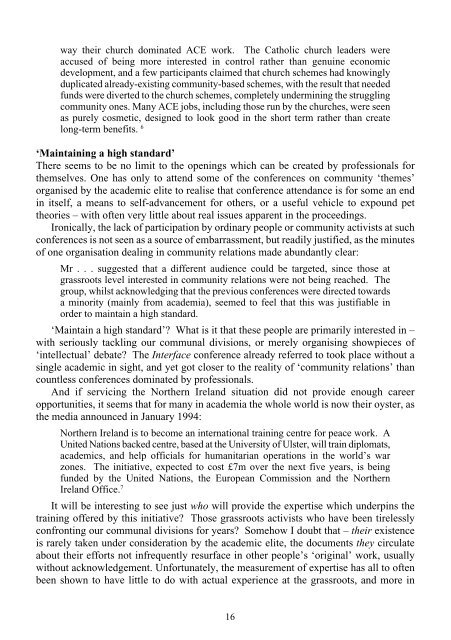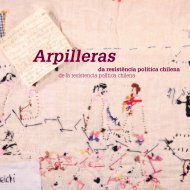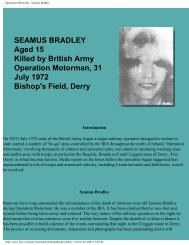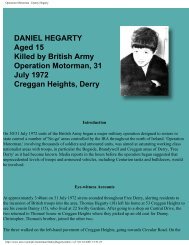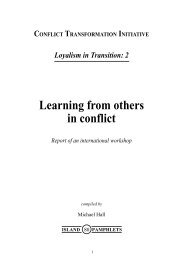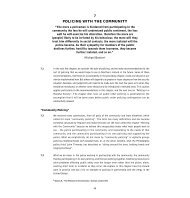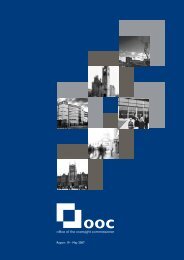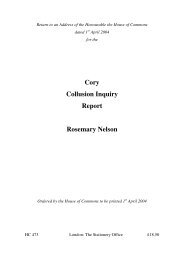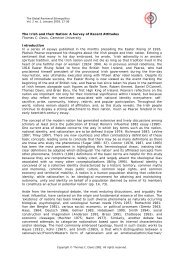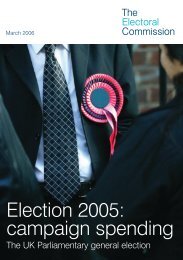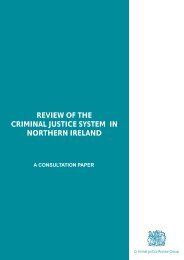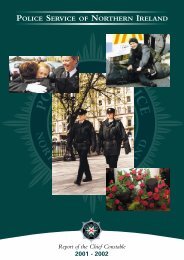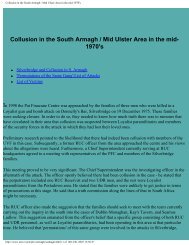(14) Reinforcing Powerlessness - CAIN - University of Ulster
(14) Reinforcing Powerlessness - CAIN - University of Ulster
(14) Reinforcing Powerlessness - CAIN - University of Ulster
You also want an ePaper? Increase the reach of your titles
YUMPU automatically turns print PDFs into web optimized ePapers that Google loves.
way their church dominated ACE work. The Catholic church leaders wereaccused <strong>of</strong> being more interested in control rather than genuine economicdevelopment, and a few participants claimed that church schemes had knowinglyduplicated already-existing community-based schemes, with the result that neededfunds were diverted to the church schemes, completely undermining the strugglingcommunity ones. Many ACE jobs, including those run by the churches, were seenas purely cosmetic, designed to look good in the short term rather than createlong-term benefits. 6‘Maintaining a high standard’There seems to be no limit to the openings which can be created by pr<strong>of</strong>essionals forthemselves. One has only to attend some <strong>of</strong> the conferences on community ‘themes’organised by the academic elite to realise that conference attendance is for some an endin itself, a means to self-advancement for others, or a useful vehicle to expound pettheories – with <strong>of</strong>ten very little about real issues apparent in the proceedings.Ironically, the lack <strong>of</strong> participation by ordinary people or community activists at suchconferences is not seen as a source <strong>of</strong> embarrassment, but readily justified, as the minutes<strong>of</strong> one organisation dealing in community relations made abundantly clear:Mr . . . suggested that a different audience could be targeted, since those atgrassroots level interested in community relations were not being reached. Thegroup, whilst acknowledging that the previous conferences were directed towardsa minority (mainly from academia), seemed to feel that this was justifiable inorder to maintain a high standard.‘Maintain a high standard’? What is it that these people are primarily interested in –with seriously tackling our communal divisions, or merely organising showpieces <strong>of</strong>‘intellectual’ debate? The Interface conference already referred to took place without asingle academic in sight, and yet got closer to the reality <strong>of</strong> ‘community relations’ thancountless conferences dominated by pr<strong>of</strong>essionals.And if servicing the Northern Ireland situation did not provide enough careeropportunities, it seems that for many in academia the whole world is now their oyster, asthe media announced in January 1994:Northern Ireland is to become an international training centre for peace work. AUnited Nations backed centre, based at the <strong>University</strong> <strong>of</strong> <strong>Ulster</strong>, will train diplomats,academics, and help <strong>of</strong>ficials for humanitarian operations in the world’s warzones. The initiative, expected to cost £7m over the next five years, is beingfunded by the United Nations, the European Commission and the NorthernIreland Office. 7It will be interesting to see just who will provide the expertise which underpins thetraining <strong>of</strong>fered by this initiative? Those grassroots activists who have been tirelesslyconfronting our communal divisions for years? Somehow I doubt that – their existenceis rarely taken under consideration by the academic elite, the documents they circulateabout their efforts not infrequently resurface in other people’s ‘original’ work, usuallywithout acknowledgement. Unfortunately, the measurement <strong>of</strong> expertise has all to <strong>of</strong>tenbeen shown to have little to do with actual experience at the grassroots, and more in16


